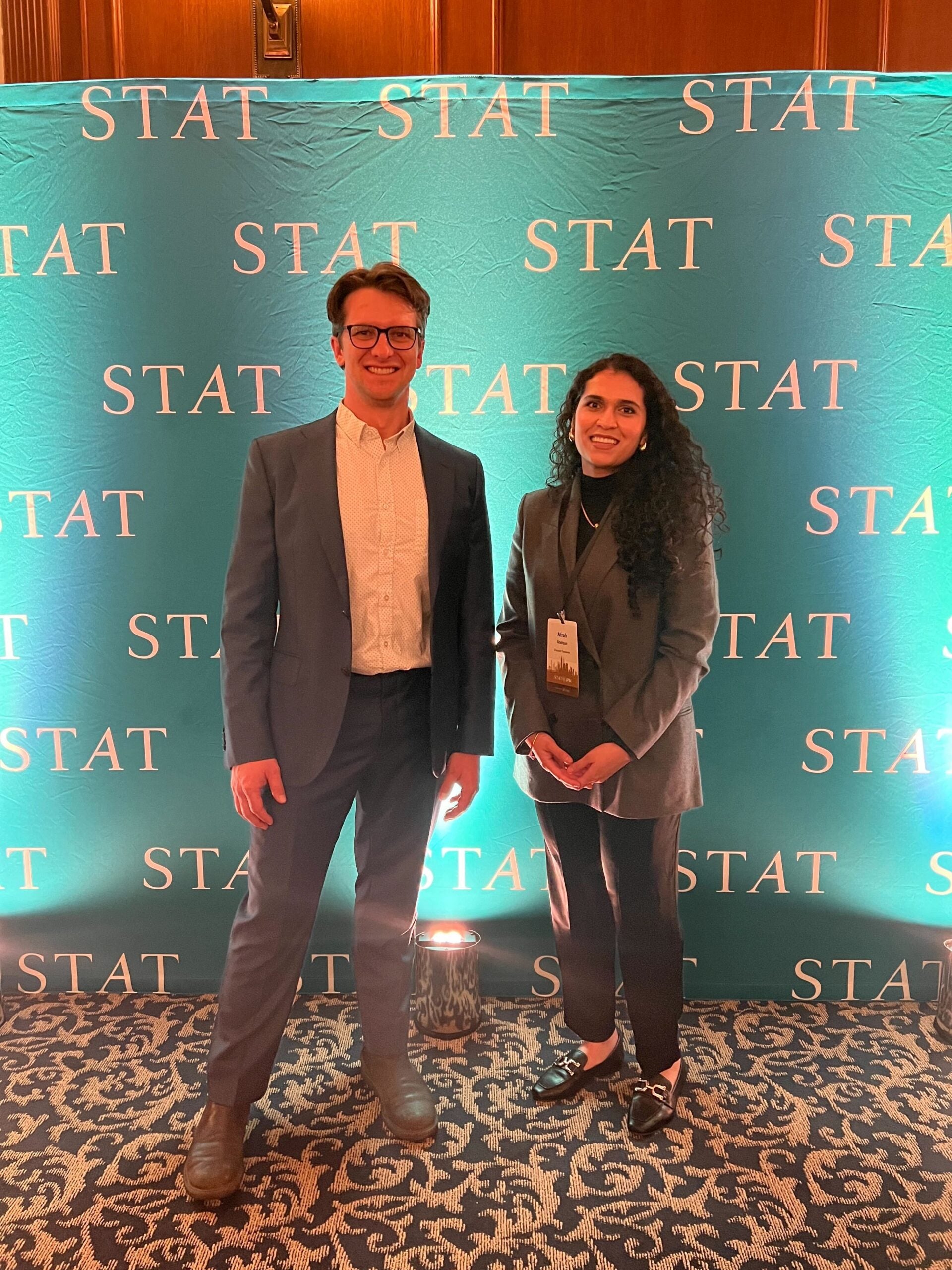Virtual Twins and Beyond: Transforming the Future of Life Sciences

In the rapidly evolving landscape of artificial intelligence (AI), its integration across various sectors is undeniable—with healthcare and drug development at the forefront of this transformation.
Explore how this technology is revolutionizing the life sciences industry in this conversation between Medidata’s Afrah Shafquat, Senior Data Scientist II and Jacob Aptekar, VP, Trial Design Solutions, Medidata AI.
What Does "AI Everywhere" Mean for the Industry?
Afrah: “AI everywhere” is the idea that AI can be completely interspersed with everything that we do. In healthcare, AI can accelerate disease prediction and optimize diagnostic processes. The emergence of generative AI is democratizing use of technology, revolutionizing every industry—even beyond life sciences.
Jacob: In the coming years, AI will be pivotal in drug development programs, from identifying drug targets to optimizing molecules and designing clinical trial protocols. AI's role in data collection, anomaly detection, and providing insights to regulators will become increasingly crucial.
How Is AI Advancing Precision Medicine and the Development of Virtual Twins?
Afrah: Virtual twins offer a digital counterpart of patients that encapsulates their unique characteristics and responses to treatments. They can facilitate an in-silico clinical trial pipeline—essentially a simulation of how a trial might unfold for an individual, allowing for the prediction of individual outcomes to drugs or interventions with unprecedented accuracy. Moreover, these virtual twin models can be used to anticipate adverse events allowing for improved targeted mitigation strategies.
Jacob: The concept of virtual twins underscores a broader shift towards simulation-based drug development and clinical trials. With comprehensive digital models, we can simulate countless scenarios—from drug interactions to trial designs—before any real-world application. This streamlines the development process and significantly enhances the safety and efficacy of treatments, ensuring that by the time a drug reaches a patient, it has undergone extensive virtual testing.
Afrah: The utility of virtual twins also spans beyond clinical trials. For instance, virtual twins are instrumental in surgical planning, offering a safer, more precise roadmap for complex procedures. Dr. David Hoganson's work at Boston Children's Hospital exemplifies this, where virtual twins of organs are used to minimize surgical risks for pediatric patients.
What Exciting Advancements Did You Note from Recent Industry Discussions?
Jacob: A standout moment for me was hearing from Peter Marks, the director of CBER, at the recent STAT at JP Morgan conference. His discussion on the FDA's openness to alternative evidence beyond traditional randomized controlled trials (RCTs) for drug approvals was particularly enlightening. What resonated with me was the FDA's stance that a thorough mechanistic understanding of a drug's function could lower the necessity for long-term clinical endpoints. This flexibility could significantly accelerate the clinical development process, marking a shift towards more nuanced, evidence-based approvals. Their openness to alternative evidence for drug approval, beyond traditional randomized controlled trials (RCTs), is also particularly promising. This approach could accelerate the clinical development process significantly.
Afrah: I agree, the FDA’s recognition of the need for regulatory innovation to match AI's pace in pharma was a standout. And it's not just about speeding up processes; the FDA's readiness to consider new forms of evidence and trial outcomes is crucial for facilitating a more dynamic, responsive regulatory environment. This evolution reflects a broader industry trend towards more personalized and precise healthcare solutions.

Jacob and Afrah at the 2024 STAT at JP Morgan Conference.
Looking Ahead, What Do You Think Will Be the Most Significant Impact of AI on Patients?
Afrah: Coupled with seamless integration of continuous monitoring devices, AI can revolutionize health monitoring, accelerating preventative healthcare and early detection. AI also has the potential to democratize access to healthcare data, enhance comprehension, and increase transparency in how this data is used. Patient clouds will be central in delivering this experience to patients, offering real-time access to collected data, insights, and recommended actions.
Jacob: The near-term focus will likely be on improving clinical trial accessibility and patient understanding of trials. Over the next decade, AI could lead to a new class of gene-editing-based personalized medicines, transforming treatment options and the drug development landscape.
What Challenges Remain in Integrating AI into Life Sciences?
Jacob: Data accessibility and operational efficiency are significant hurdles. The industry lacks the competitive pressure found in other sectors, which could slow AI adoption despite its potential to streamline drug development and patient care.
Afrah: Beyond data accessibility issues, life sciences faces unique innovation challenges. In contrast to tech where culture of experimentation, agility, and a higher risk appetite is encouraged, integrating AI in life sciences faces stringent regulatory processes and tends to be risk-averse due to patient safety and ethical considerations. However, I am optimistic that AI will transform the regulatory process itself and help in expediting and predicting regulatory success.
Learn how Medidata leverages AI to innovate the next era of healthcare.
Explore Related Articles
Contact Us

